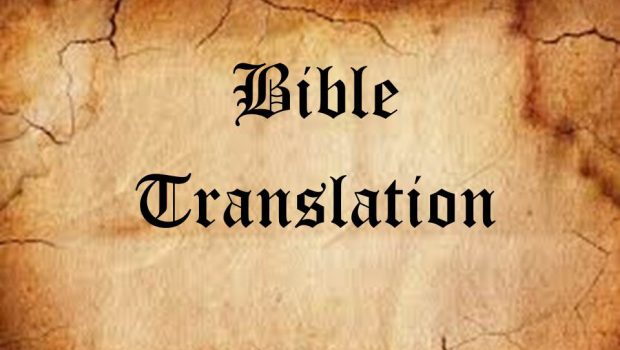The Christian Standard Bible: A Review
My (modern) Bible translation of preference is the Holman Christian Standard Bible (HCSB). While many Reformed brothers prefer the ESV for its literal translation approach, I believe it may compromise readability unnecessarily. In my view, the HCSB strikes a very careful balance between being faithful to the original text of Scripture and being highly readable. No translation is perfect, of course. But as far as translations go, especially those that rely on the Modern Critical Text, I believe the HCSB is particularly good.
But the Holman Christian Standard Bible, like the ESV, has undergone a revision. Unlike the ESV, the HCSB is also getting a name change, it will now simply be the Christian Standard Bible (CSB). Given that I have so often promoted and recommended the HCSB, and for many years I used it in my preaching, I was naturally interested to see what revisions were made. Given that the choice of a good Bible translation can have major ramifications in our walk with the Lord, I think all of us should be careful in how we evaluate translations, especially as the number of unique translations grows.
There are fundamentally two criteria on which we should evaluate every translation: Translation philosophy, and manuscript tradition (for a more complete explanation of these points, read this post). Translation philosophy basically refers to whether a translation is more literal and tries to preserve the very words and form of the original text as much as possible, or whether it is more dynamic and tries to make the original ideas as understandable as possible without as much regard for specific words and form. Manuscript tradition refers to whether the underlying text used for translation is from the family of the Majority Text (such as the Textus Receptus) or from the group of Modern Critical Texts (MCT). I strongly favor translations that are more literal because I believe the very words of Scripture itself are inspired (Luke 16:17, 2 Timothy 3:16-17). I also favor translations that rely on the Majority Text over the Modern Critical Text, though my argument here is not as strong.
The Christian Standard Bible relies on the Modern Critical Text (Nestle Aland). In terms of translation philosophy it claims, like the HCSB before it, to utilize optimal equivalence. Optimal equivalence is meant to be a middle ground between literal (formal equivalence) and thought-for-thought (dynamic equivalence) translations. Thus if we take the ESV, KJV, and NASB is examples of literal translations, and the NIV, NLT, and CEV as examples of thought-for-thought translations, the CSB should land somewhere between them. Basically it should be more literal than the NIV, and more readable than the ESV.
But it is on the literal front that the CSB fails. One of the bellwether issues in Bible translation is the use of gender-neutral language. The Bible often uses certain terms (notably of the male gender) generically. Thus if we look at 1 Corinthians 1:26 in the HCSB, we read “Brothers, consider your calling: Not many are wise from a human perspective, not many powerful, not many of noble birth.” Obviously this address is to the entire church, male and female alike. Yet as God inspired it, the term we translate “brothers” is a male-gendered word that is meant generically. The CSB translates this verse nearly identically, “Brothers and sisters, consider your calling: Not many were wise from a human perspective, not many powerful, not many of noble birth.”
The changes in this revision are subtle, the verse itself is nearly identical. The differences are the addition of “and sisters” at the beginning of the verse, and a change from “are” to “were” in the middle of the verse. But remember that Scripture is inspired in the original manuscripts, and it is inspired down to the very word. Also remember that no translation is perfect. No translation is completely word-for-word, and no reputable translation ignores the actual words in its translation.
But this raises an interesting question: If Scripture, in the original writing, uses a gender-specific word generically, should we translate the word itself? Or should we translate the meaning behind the use, making sure to include both genders? As you can see, the HCSB opted to translate the word itself, and include footnotes that specify the term “brother” is being used generically. The CSB, however, takes a different approach, and opts to translate the general idea by going ahead and adding the term “and sisters” to clarify the meaning of the generic use of “brothers.”
This lessens the value of the CSB in my view, so much so that I do not intend to use it. The great advantage of the HCSB was that it truly did represent optimal equivalence, balancing a highly accurate translation with a high degree of readability. The CSB remains readable, but it has compromised on accuracy. And please realize I say this not because of just one verse (this verse is but an illustration), but because the philosophy at play in this one verse is carried out in the translations of numerous verses and passages throughout the CSB (I have not read the entire translation, I’ve only compared representative passages).
The bottom line is that the drive for gender-neutral language comes from a society that attacks the idea of gender itself. If our society begins to use exclusively gender-neutral pronouns, such as “zhe,” will we render the pronouns referring to God in new translations as “zhe” because, theologically speaking, God does not have a gender? Perish the thought! God is competent in His own revelation of Himself, and though He does not Himself have a gender, He does reveal Himself using the pronouns of one particular gender. [As a side, Jesus assumed the male gender in the Incarnation].
In 10 years or so, once our society is thoroughly indoctrinated with ideas about gender fluidity, and our language is dominated by the use of gender-neutral pronouns, scholars will be debating what pronoun to use to refer to God, despite the indisputable fact that God used male pronouns to refer to Himself. Just as today scholars debate about whether to use the term “brother” generically, despite the fact God Himself used the equivalent terms generically when Scripture was inspired.
This isn’t really about gender pronouns or the generic use of terms like “brothers.” This is about the nature of the inspiration of Scripture itself, the very words are inspired. This is also about the nature of God Himself. And if God had wanted to reveal Himself as “zhe,” He would have waited 2,000 years for the Incarnation.
Beyond this, we have to recognize that at some point our ability to create new translations and revisions of translations far outpaces our culture’s own linguistic developments and changes and scholar’s own new insights into the text. The HCSB is not even 20 years old. English has not changed so significantly that the HCSB (which itself was revised before now) requires a completely new revision. Scholarship has not advanced so much that the HCSB requires a completely new revision. The text of Scripture itself never changes, though our insight into it does. We simply lack any real need for a translation like the CSB.
Even if there was a need for the CSB, it would fail to meet that need. The CSB has veered far more toward dynamic equivalence than the HCSB did. As such, what real advantage does the CSB offer that cannot be gained from any NIV translation after the year 2011? With the CSB, we have gone from genuine optimal equivalence to yet one more contender in the dynamic category, a category which itself is already overflowing with more options than can reasonably be necessary. The CSB achieves very little, apart from rendering obsolete the one genuine contender in the optimal equivalence category.
I am beginning to suspect that Bible translation is more about generating new sales than about actually making the text more understandable or more accurate. We are reaching the point where Bible translations are revised nearly with the speed of textbooks. And the fact is that neither our understanding of the text nor the conventional use of the English language change significantly enough over the span of 10-15 years to justify our ever more frequent revisions of biblical translations. It seems the real motivation may be generating sales. And while I find nothing immoral with making a profit, I find a great deal immoral with reducing the promulgation of the very Word of God to a marketing ploy that takes advantage of Christ’s sheep and Christ’s churches.
Soli Deo Gloria,
Joey










